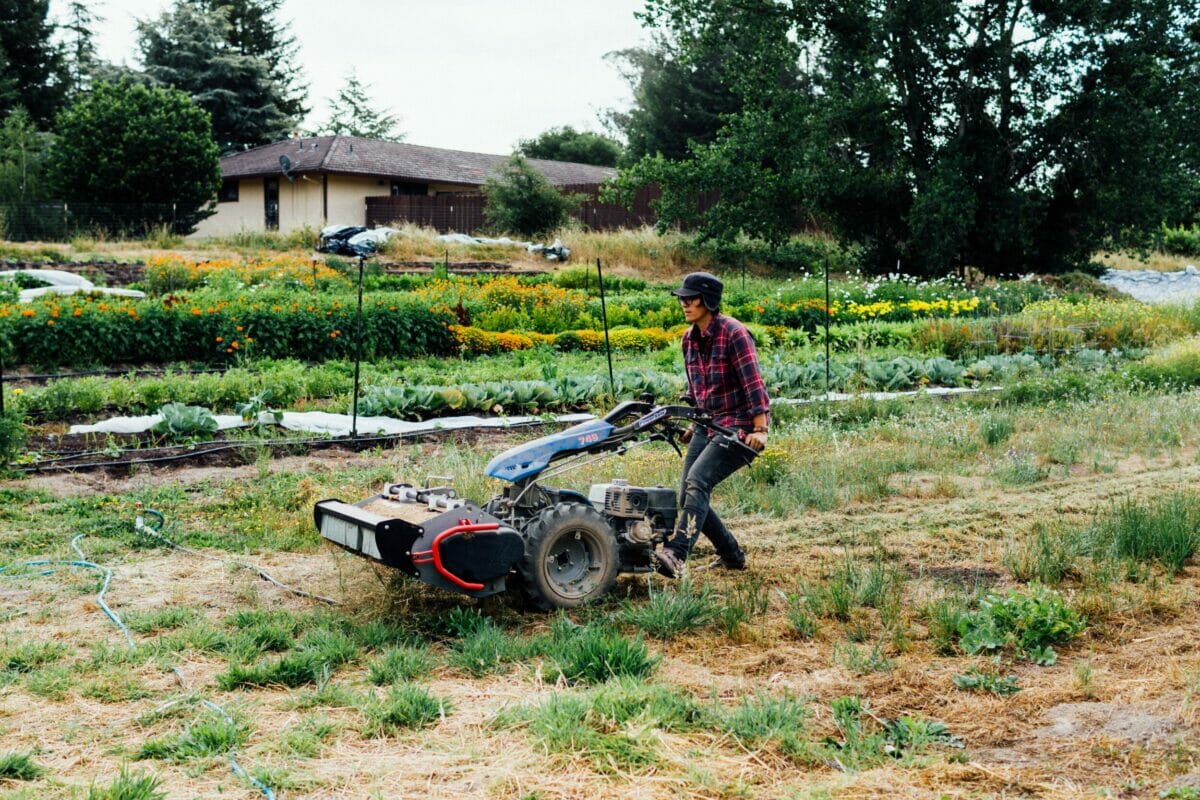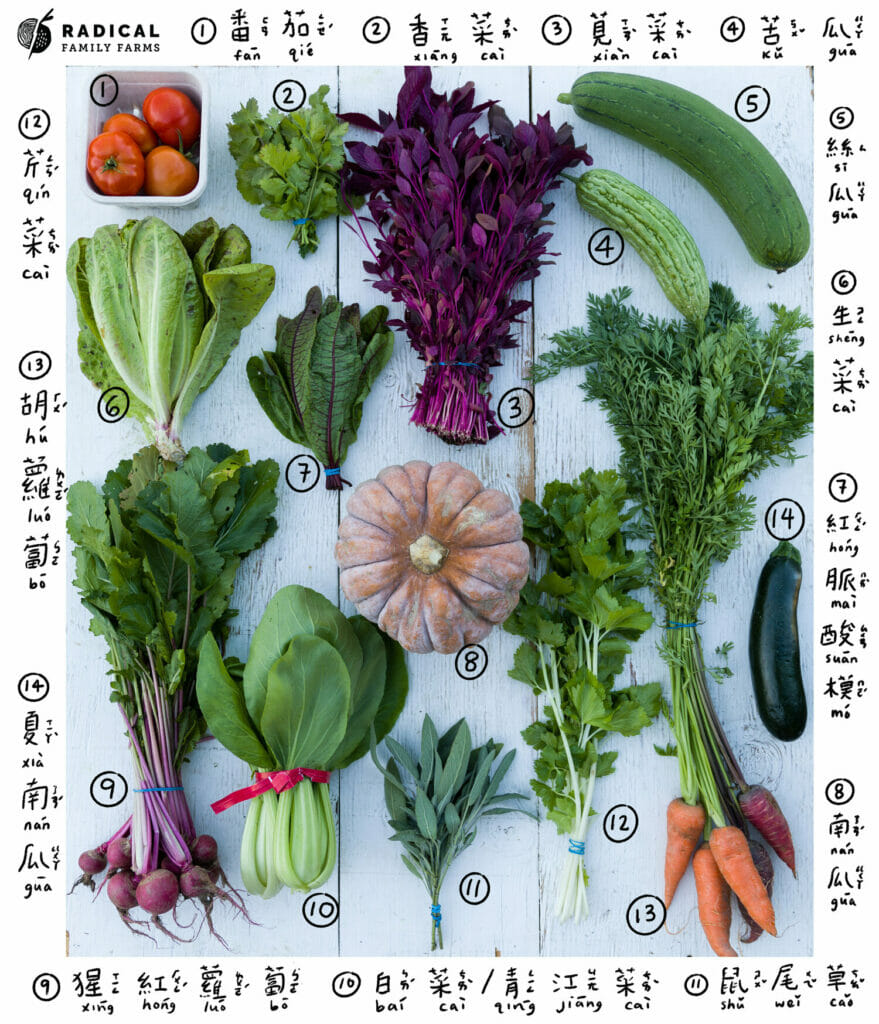This Modern Farmer Grows Her Heritage
Leslie Wiser focuses on growing Asian heritage vegetables.
This Modern Farmer Grows Her Heritage
Leslie Wiser focuses on growing Asian heritage vegetables.

Leslie Wiser works on her farm, which she started in 2019. courtesy of Radical Family Farms
For many growers, farming is a part of their identity. But, for Leslie Wiser, it goes even deeper than that—her identity is also wrapped up in what she farms.
Wiser started Radical Family Farms in 2019 as a way to explore her heritage and help other Asian-Americans explore theirs through food. Heading into her third growing season with partner Sarah Deragon, she primarily grows vegetables that come from her Asian and German-Polish Jewish heritage on 1.5 acres in Sebastopol, California. This includes ingredients such as bitter melon, Chinese bald head mustard and Southeast Asian herbs that many of her customers—from chefs to immigrant families—had been unable to find in the United States, where only 0.7 percent of the country’s 3.4 million producers identify as Asian, according to the 2017 USDA Census of Agriculture.
This was true for Wiser’s own family, too. Growing up in the Midwest, her Taiwanese mother and Polish grandmother didn’t have access to many of the ingredients they needed to cook the traditional dishes of their homelands, so Wiser was unfamiliar with most of the vegetables she now grows.
She first became interested in farming as an undergraduate student at Indiana University when a professor connected her with an internship on a farm in Alaska through an organization called ATTRA. The group provides technical assistance to farmers working in sustainable agriculture. She then went on to pursue a master’s degree and career in digital marketing. It wasn’t until the birth of her first child, now nine years old, that she realized she wanted to return to farming.
“I kind of forgot I had that job [in farming] until I had my kids,” Wiser says. “I wanted a different lifestyle raising kids. I wanted them to know where their food comes from.” This included the cultural roots of their food, which Wiser calls identity farming.
A trip back to Taiwan gave her the idea of growing Asian heritage vegetables and she started helping out in the school garden where she enrolled her children in preschool.
She gathered her seed list from family members by asking both sides of her family what vegetables they wished they had better access to, then ordered the seeds from Kitazawa Seed Company, an Oakland-based company focused on Asian vegetables, with, she says, “really good growing instructions.”
Wiser learned more about these heritage vegetables, including their Chinese names, from The Chinese Kitchen Garden, a book by Wendy Kiang-Spray that she now asks everybody who works for her to read. Wiser uses what she calls “beyond organic” regenerative agriculture practices, such as no till and other skills she learned from her season in Alaska and in workshops.
She is also learning along the way. Growing Asian heritage vegetables sometimes requires modifying the season in which some of them can be grown because of the different growing climate of Northern California compared to the hotter and more humid regions from which they tend to come.
“It’s a continual learning process with a lot of trial and error,” she says and adds that she’s made friends with other Asian farmers and learns from their experience.

Wiser takes extra steps to help her customers learn more about the vegetables, giving background on each and labeling them in both Chinese and English. The Chinese labels include traditional Chinese characters, the sound-based writing system of Zhuyin (also called Bopomofo) and Pinyin (the Romanization system for Standard Mandarin Chinese).
When the farm began in 2019, they sold to a mix of chefs and Community Supported Agriculture customers. The pandemic caused the farm to shift its business more to a CSA model, and they ended last season with 150 members, up from 30 the previous year. This year, they’ll continue mostly with CSA members, some chefs and possibly a farmers’ market.
Wiser is also piloting a food-access program this year, in which the farm will donate 10 CSA memberships to community elders in need. Funded by a grant, Radical Family Farms will offer “culturally relevant food” to Asian elders, as well as disabled and immunocompromised members of the Asian-American community, who may not have much cooking experience with some of the foods they received through other aid.
Correction: April 1, 2021
An earlier version of this article misstated that Wiser’s pilot food-access program happened the previous season. She is in fact running it this year.
Follow us
This work is licensed under a Creative Commons Attribution-NoDerivatives 4.0 International License.
Want to republish a Modern Farmer story?
We are happy for Modern Farmer stories to be shared, and encourage you to republish our articles for your audience. When doing so, we ask that you follow these guidelines:
Please credit us and our writers
For the author byline, please use “Author Name, Modern Farmer.” At the top of our stories, if on the web, please include this text and link: “This story was originally published by Modern Farmer.”
Please make sure to include a link back to either our home page or the article URL.
At the bottom of the story, please include the following text:
“Modern Farmer is a nonprofit initiative dedicated to raising awareness and catalyzing action at the intersection of food, agriculture, and society. Read more at <link>Modern Farmer</link>.”
Use our widget
We’d like to be able to track our stories, so we ask that if you republish our content, you do so using our widget (located on the left hand side of the article). The HTML code has a built-in tracker that tells us the data and domain where the story was published, as well as view counts.
Check the image requirements
It’s your responsibility to confirm you're licensed to republish images in our articles. Some images, such as those from commercial providers, don't allow their images to be republished without permission or payment. Copyright terms are generally listed in the image caption and attribution. You are welcome to omit our images or substitute with your own. Charts and interactive graphics follow the same rules.
Don’t change too much. Or, ask us first.
Articles must be republished in their entirety. It’s okay to change references to time (“today” to “yesterday”) or location (“Iowa City, IA” to “here”). But please keep everything else the same.
If you feel strongly that a more material edit needs to be made, get in touch with us at [email protected]. We’re happy to discuss it with the original author, but we must have prior approval for changes before publication.
Special cases
Extracts. You may run the first few lines or paragraphs of the article and then say: “Read the full article at Modern Farmer” with a link back to the original article.
Quotes. You may quote authors provided you include a link back to the article URL.
Translations. These require writer approval. To inquire about translation of a Modern Farmer article, contact us at [email protected]
Signed consent / copyright release forms. These are not required, provided you are following these guidelines.
Print. Articles can be republished in print under these same rules, with the exception that you do not need to include the links.
Tag us
When sharing the story on social media, please tag us using the following: - Twitter (@ModFarm) - Facebook (@ModernFarmerMedia) - Instagram (@modfarm)
Use our content respectfully
Modern Farmer is a nonprofit and as such we share our content for free and in good faith in order to reach new audiences. Respectfully,
No selling ads against our stories. It’s okay to put our stories on pages with ads.
Don’t republish our material wholesale, or automatically; you need to select stories to be republished individually.
You have no rights to sell, license, syndicate, or otherwise represent yourself as the authorized owner of our material to any third parties. This means that you cannot actively publish or submit our work for syndication to third party platforms or apps like Apple News or Google News. We understand that publishers cannot fully control when certain third parties automatically summarize or crawl content from publishers’ own sites.
Keep in touch
We want to hear from you if you love Modern Farmer content, have a collaboration idea, or anything else to share. As a nonprofit outlet, we work in service of our community and are always open to comments, feedback, and ideas. Contact us at [email protected].by Catie Joyce-Bulay, Modern Farmer
March 27, 2021
Modern Farmer Weekly
Solutions Hub
Innovations, ideas and inspiration. Actionable solutions for a resilient food system.
ExploreExplore other topics
Share With Us
We want to hear from Modern Farmer readers who have thoughtful commentary, actionable solutions, or helpful ideas to share.
SubmitNecessary cookies are absolutely essential for the website to function properly. This category only includes cookies that ensures basic functionalities and security features of the website. These cookies do not store any personal information.
Any cookies that may not be particularly necessary for the website to function and are used specifically to collect user personal data via analytics, ads, other embedded contents are termed as non-necessary cookies.